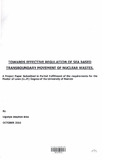| dc.description.abstract | We live in a world that is continuously aware of the risk posed by global
warming. Fuel sources that emit carbon dioxide and other green house gases are
critically viewed. There is a growing demand to "go-green" in every industry.
Carbon trading is a fast growing trade and every country especially in the
developed world is being called upon to observe and adhere to the Kyoto
Protocol and whatever instrument that will succeed it, be it the Copenhagen
Accord or any other instrument. There is also the call to undertake roll back
measures to cut back on emissions. This continuous push has led many nations
to seek alternative energy sources, such as wind power, solar power and of
course nuclear power. The 44th President of America, Mr. Barrack Obama,
commenced his term on inter-alia the promise to seek alternative sources of fuel
that will not contribute to global warming, while reducing America's reliance on
foreign oil. Several nations such as Japan, the United Kingdom, and France all
have embraced nuclear power as one key alternative to carbon based fuels.
Indeed even North Korea and India keep pushing for their right to develop
nuclear power as a source of energy. This new drive to go green raises myriad
questions, for instance with regard to obligations under the Nuclear Non
Proliferation Treaty (NPT). However such issues are outside the scope of this
paper. The primary issues that concern this paper are different threats posed by
the reliance on nuclear power; it is the reality that utility of nuclear power is
attended by production of highly toxic non-biodegradable waste (herein called
ultra hazardous materials). | en |

